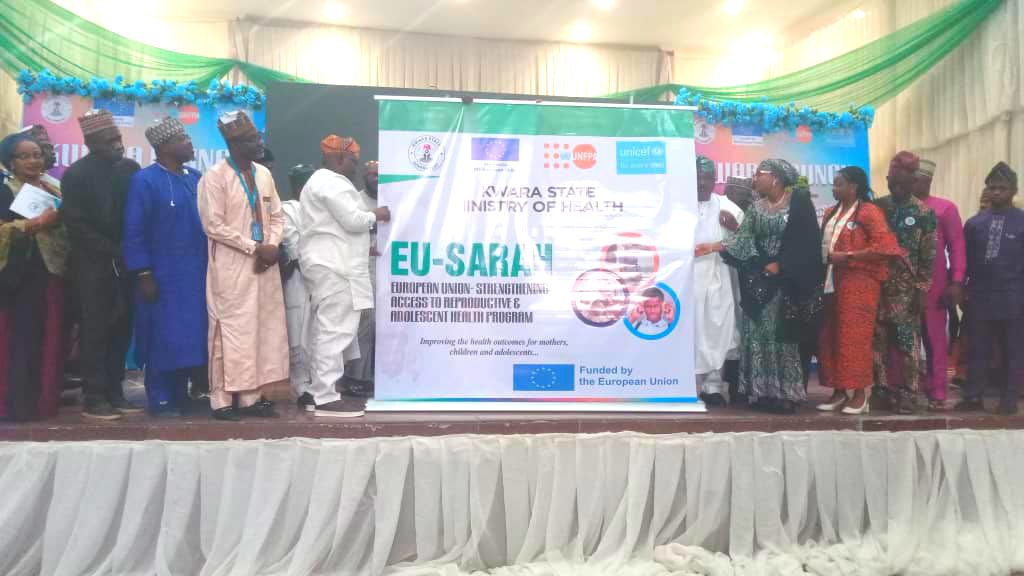By Fatima Mohammed-Lawal
The Kwara Government on Thursday in Ilorin launched the EU Strengthening Access to Reproductive and Adolescent Health (SARAH) programme.
In his address, Gov. AbdulRahman AbdulRazaq of Kwara explained that the EU-SARAH initiative represents a transformative approach to healthcare, specifically targeting the vital areas of sexual, reproductive, maternal, adolescent, and child health services.
He stated that Kwara is one of the three benefiting states of this EU grant, together with Sokoto and Adamawa states.
The Governor who was represented by Mr Kayode Alabi, the Deputy Governor of Kwara, noted that the state has at least one functional primary health facility in all the 193 wards in the state.
He disclosed that the initiative is supported by United Nations Children Fund (UNICEF), United Nations Population Fund (UNFPA) and the Federal Ministry of Health.
The governor said it aims to transform our approach to reproductive and maternal health in the state.
“Reproductive and Adolescent health is a cornerstone of public health, that plays a crucial role in the overall well-being of our communities.
“Yet across Nigeria, many women and adolescents continue to face significant barriers to accessing essential reproductive health services.
“We know that these barriers lead to preventable maternal deaths and, and a cycle of ill health that impacts families and communities for generations,” he said.
AbdulRazaq pointed out that Kwara has made significant progress in improving maternal and child health outcomes.
He observed that the state currently has one of the lowest Maternal Mortality Rates in the country.
“We have also made significant progress in reducing the Under-five Mortality rate. Despite these gains, our vision is to eliminate preventable maternal deaths and ensure that no child is lost to preventable diseases.
“This SARAH program will support our efforts to improve access to quality healthcare services, particularly for our adolescents, women, and children.
“It will also support our efforts to strengthen Kwara’s healthcare system, improve our quality of care, and reduce healthcare inequalities,” he said.
He added that this initiative will also ensure that every woman, girl, and adolescent in Kwara has access to the reproductive health services they need.
“This project aligns perfectly with our administration’s commitment to improving the health and well-being of Kwarans, especially women, girls, and children,” he said.
Earlier in her welcoming address, Dr. Amina El-Imam, Kwara Commissioner for Health commended the European Union, UNFPA, and UNICEF, for their steadfast support and partnership with Kwara.
She noted that the initiative is a means of prioritizing the well-being of women, adolescents, and, children- who are the backbone of our society and the stewards of our future.
El-Imam stated that access to comprehensive and integrated health services is a fundamental human right, “yet we know that many individuals face barriers that prevent them from receiving the care they need”.
She noted that the EU-SARAH program aims to break down those barriers, by improving access to reproductive and maternal health services.
“This program will not only save lives but also empower our women and youth to make informed choices about their health and futures.
“Another critical component of this program is the capacity-building of our healthcare workers who are the heart of our healthcare system.
“We are committed to providing them with the training and resources they need to deliver the best possible care, SARAH will help to facilitate this in the program’s focus areas,” she said.
In his remark, the Health Specialist
UNICEF Kaduna Field Office, Dr Idris Baba stated that the EU is providing the funding of SARAH for three states; Kwara, Kogi, and Sokoto to strengthen health focussing on adolescents.
“This health intervention costs about $45 million, so this is a welcome development. We hope the government will show transparency and use it for the benefit of the people.
“We expect the capacity of the state to have been built both at the state and national level. They should have capacity to use data to build policy, and ensure service delivery,” he said.
